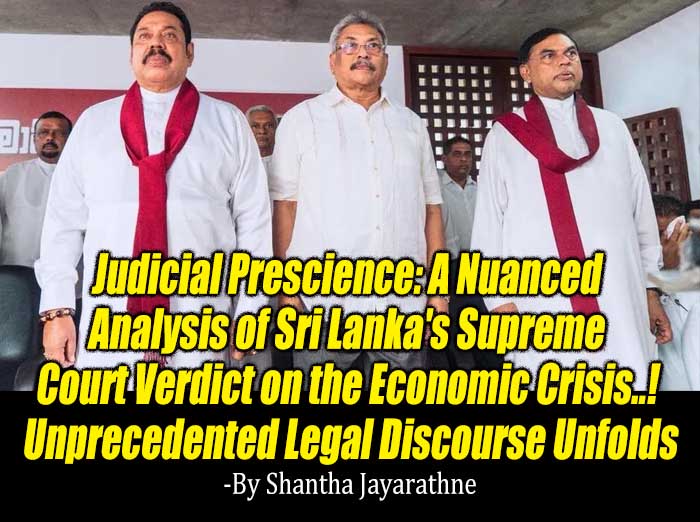By Shantha Jayarathne

(Lanka-e-News 22.Nov.2023, 6.55PM) In a jurisprudential milestone, the Supreme Court of Sri Lanka recently issued a judgment that castigates the Rajapaksa triumvirate and select officials for their discernible contribution to the nation's economic quagmire. This article endeavors to dissect the intricacies of the verdict and the profound implications it holds for a nation at the crossroads of justice and political accountability.
In a jurisprudential tableau, the court's majority opinion unequivocally indicts the Rajapaksa siblings—President Gotabaya, the erstwhile Prime Minister and Finance Minister Mahinda, and Basil Rajapaksa. Concurrently, culpability extends to a quintet of confidants strategically positioned in key governmental roles: former Central Bank Governors Ajith Nivard Cabraal and W.D. Lakshman, former Treasury Secretary S.R. Attygalle, Monetary Board's erstwhile member Samantha Kumarasinghe, and former Finance Ministry Secretary and Presidential Secretary P.B. Jayasundera.
A meticulous scrutiny of the court's 120-page exegesis reveals an erudite deconstruction of President Gotabaya Rajapaksa's fiscal missteps, precipitating an economic maelstrom that ensnared millions in destitution. The court, with sagacious deliberation, expounds upon the 'imprudent' tax revisions in 2019, elucidating their cascading impact on credit rating downgrades, foreign reserve depletion, and the international financial market estrangement.
Unlike a precedent wherein financial penalties were levied, the recent Supreme Court pronouncement refrains from imposing pecuniary sanctions on the accused. This judicious restraint, however, metamorphoses into a symbolic gesture, necessitating a dialectical interplay between legal and administrative avenues to confer tangible justice.
Leaders of the opposition, intelligentsia, and civil society advocate for punitive actions, propelling a nuanced discourse on the recovery of funds and revocation of civic privileges. Justice Minister Wijedasa Rajapaksa articulates a legal path, envisioning the formation of a Presidential Commission of Inquiry, yet the exigencies of a political milieu cast in transactional hues present formidable obstacles.
While the tides of political inertia may impede institutional accountability, the court's ruling presents an empirical avenue for individual reparations. Sri Lankans, aggrieved by the economic tumult, find recourse through a legal prism, transcending the bureaucratic impasse.
The Rajapaksa family's response, ranging from President Gotabaya's tempered acknowledgment to Basil Rajapaksa's acerbic wit, serves as a compelling epilogue. Namal Rajapaksa's legal critique, albeit misinformed, raises broader questions about the balance between governmental prerogatives and judicial oversight.
In the labyrinthine corridors of post-judicial contemplation, Sri Lanka stands at the crossroads of accountability and legal exigency. The Supreme Court's erudite edict delineates a path forward, yet the efficacy of this trajectory hinges upon the nascent interplay between legal precepts and the nebulous contours of political will. As the nation grapples with the echoes of its judicial reckoning, the imperative for institutional rejuvenation and democratic fortitude remains paramount.
Former Senior Consultant
Sri Lanka Institute of Development Administration (SLIDA)
[email protected]
---------------------------
by (2023-11-22 16:05:59)
Leave a Reply